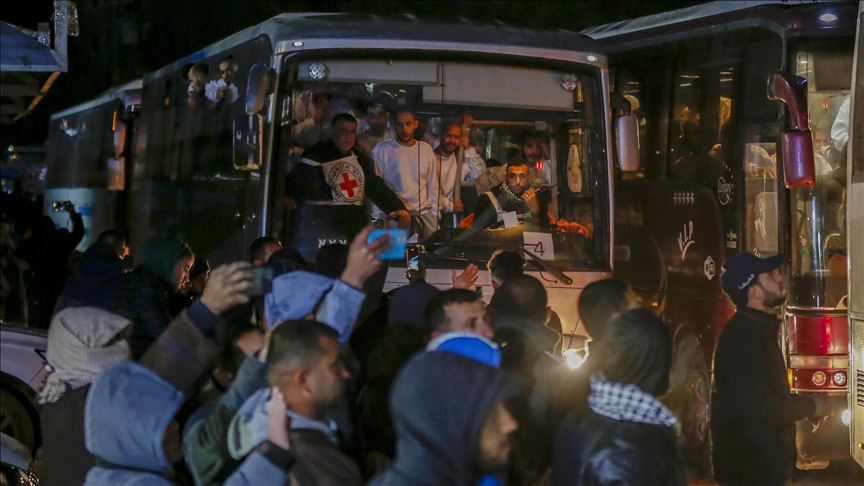Hamas urges mediators to oblige Israel to start talks for 2nd phase of Gaza ceasefire deal
Hamas urges international community to pressure Israel to open Gaza crossings, allow entry of life-saving humanitarian aid
 Palestinian prisoners released in swap agreement arrive in Gaza
Palestinian prisoners released in swap agreement arrive in Gaza
ANKARA
The Palestinian resistance group Hamas called on mediators on Monday to intervene to prevent the collapse of a Gaza ceasefire and prisoner exchange agreement and start negotiations for the second phase of the deal.
In a televised speech, senior Hamas leader Osama Hamdan accused Israeli Prime Minister Benjamin Netanyahu of sabotaging efforts to start negotiations for a second phase of the Gaza ceasefire deal.
"We call on the international community and the UN to work to compel the occupation to return to the agreement and enter (talks for) its second phase, leading to a permanent ceasefire, the withdrawal of all forces, relief and shelter for our people, and the reconstruction of what the occupation has destroyed,” he said.
He also called for implementing UN Security Council Resolution 2735 “to achieve a just solution to the Palestinian cause," including the right to self-determination, the establishment of a sovereign and independent Palestinian state with Jerusalem as its capital, and the return of refugees.
Hamdan urged the international community “to pressure the occupation to open the Gaza crossings and allow the entry of life-saving humanitarian aid."
Humanitarian violations
Regarding humanitarian aid, Hamdan accused Israel of failing to meet its obligations, saying it allowed only 978 fuel trucks into Gaza over 42 days—an average of 23 per day—far below the agreed 50 daily.
He added that Israel blocked the commercial sector from importing fuel despite the agreement explicitly permitting it.
According to Hamdan, Israel has only permitted 15 mobile homes into Gaza out of the 60,000 stipulated in the deal and has allowed only a limited number of tents.
He also criticized Israel for preventing the entry of heavy equipment needed to clear rubble and recover bodies, saying only nine machines were allowed in, whereas at least 500 are required.
Additionally, Israel has blocked the entry of construction materials for infrastructure and hospital repairs and has restricted medical equipment shipments, allowing just five ambulances, Hamdan said.
He blamed Israel for rejecting civil defense equipment requests, preventing the operation of Gaza’s power plant, and blocking cash liquidity transfers to Palestinian banks while refusing to replace worn-out currency notes.
Military violations
Hamdan listed Israeli military violations, including almost daily advances beyond agreed-upon withdrawal lines, particularly in the Philadelphi Corridor, where forces exceeded the limit by 300 to 500 meters. These movements took place amid gunfire, civilian deaths, home demolitions, and land razing.
He also accused Israel of delaying its withdrawal from Rashid and Salahaddin Streets, barring displaced residents from returning for two days, violating the agreement.
According to Hamdan, Israel continued to block fishermen from accessing Gaza’s waters, fired at them, and detained several.
Additionally, Israeli aircraft operated daily during restricted hours—10 to 12 hours a day—violating airspace limitations 210 times with various reconnaissance and armed drones.
Hamdan said a total of 962 violations were recorded, resulting in 116 Palestinian deaths, 490 injuries, 210 Israeli air force flights, 77 shootings, 45 incursions, 37 shelling, and five cases of detained drivers and fishermen.
Prisoner exchange violations
On prisoner-related violations, Hamdan accused Israel of stalling releases at every stage, despite the agreement requiring releases within an hour of receiving Israeli hostages.
He added that Israel withheld the final batch of 600 prisoners for five days under “baseless pretexts.”
According to Hamdan, released detainees on Feb. 15 and 26 were forced to wear clothing with “Nazi and racist connotations.”
He also noted that Israel did not disclose the names of hundreds of Palestinian prisoners from Gaza, revealing only 2,400 detainees, and refused to release 70-year-old Gaza prisoner Siham Mousa Abu Salem.
Palestinian detainees faced beatings, torture, and humiliation until the moment of their release, Hamdan claimed.
Rafah and the Philadelphi Corridor
Regarding the Rafah border crossing in southern Gaza, Hamdan accused Israel of keeping it closed to civilian travel and blocking commercial goods and trade.
He said Israel also prevented dozens of patients and wounded people from leaving, despite prior approval for their travel.
On the Philadelphi Corridor, which runs along the Egypt-Gaza border, Hamdan said Israel did not gradually reduce its military presence as mediators had pledged. The agreement stipulated a weekly 50-meter withdrawal, but instead, Israeli forces advanced hundreds of meters daily rather than withdrawing.
Hamdan concluded that Israel failed to begin its withdrawal from the corridor on day 42 as scheduled and had yet to complete the process by day 50.
On Sunday, the Israeli government halted the entry of humanitarian aid into Gaza, hours after the first phase of the Gaza ceasefire agreement expired.
Tel Aviv tried to legitimize its move by claiming that after the first phase of the agreement ended, Hamas rejected a draft proposal for continuing negotiations put forward by US President Donald Trump's special envoy for the Middle East, Steve Witkoff, and accepted by Israel.
Hamas strongly condemned the Israeli decision to halt humanitarian aid to Gaza, calling it a "war crime" and a "blatant blow to the ceasefire agreement."
The agreement had paused Israel’s genocidal war on Gaza, which has killed nearly 48,400 people, mostly women and children, and left the enclave in ruins.
Last November, the International Criminal Court issued arrest warrants for Netanyahu and his former Defense Minister Yoav Gallant for war crimes and crimes against humanity in Gaza.
Israel also faces a genocide case at the International Court of Justice for its war on the enclave.
Anadolu Agency website contains only a portion of the news stories offered to subscribers in the AA News Broadcasting System (HAS), and in summarized form. Please contact us for subscription options.







